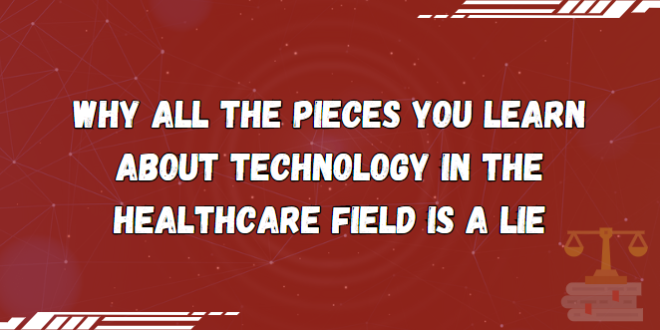
Technology has transformed various industries, including healthcare, revolutionizing the way medical professionals diagnose, treat, and care for patients. However, amidst the advancements and praise surrounding healthcare technology, there is a need to take a critical look at some common misconceptions. In this article, we will explore why everything you think you know about technology in the healthcare field might not be entirely accurate.
The Myth of Perfection
One common misconception is the belief that healthcare technology is flawless and always delivers accurate results. While technology has undoubtedly improved healthcare outcomes, it is not infallible. Diagnostic errors, software glitches, and interoperability issues are just a few examples of the imperfections that can exist within healthcare technology.
The Human Touch
Despite technological advancements, the human touch remains essential in healthcare. While machines and algorithms can assist in diagnosis and treatment, they cannot replace the empathy, intuition, and expertise of healthcare professionals. Technology should be seen as a tool to enhance, rather than replace, human care.
Data Privacy and Security Concerns
As technology becomes increasingly integrated into healthcare, concerns about data privacy and security emerge. The vast amount of personal health information stored in electronic health records and transmitted across networks raises questions about how well this data is protected from breaches and unauthorized access.
Cost and Accessibility Issues
While technology has the potential to improve healthcare outcomes, it often comes at a significant cost. The high price tags associated with acquiring and maintaining advanced medical technology can create inequalities in access to care. Additionally, not all healthcare facilities, especially in resource-limited settings, have the infrastructure or resources to adopt and utilize advanced technology.
Unrealistic Expectations
The media often portrays healthcare technology as a magical solution that can cure all ailments. This creates unrealistic expectations among patients and healthcare providers, leading to disappointment when technology fails to deliver the anticipated results. Managing expectations and understanding the limitations of technology is crucial for informed decision-making.
The Need for Proper Training
Introducing new technology into the healthcare field requires proper training for healthcare professionals. Without adequate education and training, the full potential of technology may not be realized, and its benefits may remain untapped. It is crucial to invest in comprehensive training programs to ensure that healthcare professionals can effectively and safely utilize technology in their practice.
The Role of Regulation
Regulation plays a vital role in ensuring the safety and efficacy of healthcare technology. However, keeping up with the rapid pace of technological advancements can be challenging for regulatory bodies. Striking the right balance between fostering innovation and protecting patients is an ongoing struggle in the healthcare technology landscape.
Ethical Considerations
As technology advances, ethical considerations come to the forefront. Questions arise about the ethical implications of using artificial intelligence, automation, and robotics in healthcare. Balancing the potential benefits of technology with ethical concerns, such as patient autonomy, informed consent, and data ownership, is crucial for responsible technological integration.
The Importance of User Experience
Technology should be designed with the end-user in mind, including both healthcare professionals and patients. User-friendly interfaces, intuitive workflows, and seamless integration into existing systems are critical for effective technology adoption. Neglecting the user experience can hinder the successful implementation and utilization of healthcare technology.
Interoperability Challenges
Interoperability, or the ability of different systems to communicate and exchange information, remains a significant challenge in healthcare technology. Fragmented systems and lack of standardized data formats hinder the seamless sharing of patient information between healthcare providers, potentially compromising patient care and coordination.
The Role of Artificial Intelligence
Artificial intelligence (AI) is often heralded as a game-changer in healthcare. While AI shows great promise in areas such as medical imaging and predictive analytics, its widespread adoption and integration into healthcare systems require careful consideration. Ethical issues, bias in algorithms, and the need for human oversight are essential aspects to address when utilizing AI in healthcare.
The Impact on Jobs
Automation and the use of technology in healthcare raise concerns about the potential displacement of jobs. While technology can streamline processes and improve efficiency, it can also lead to workforce reduction or shifts in job roles. Preparing the healthcare workforce for these changes and ensuring the equitable distribution of opportunities is crucial.
Misinformation and Hype
The healthcare technology landscape is filled with misinformation and exaggerated claims. Separating hype from reality is essential to make informed decisions about the adoption and utilization of technology in healthcare. Relying on evidence-based research and seeking expert opinions can help navigate the complexities of this rapidly evolving field.
Collaboration and Integration
The successful integration of technology in healthcare requires collaboration among various stakeholders. Healthcare providers, technology developers, regulators, and patients must work together to ensure that technology serves its intended purpose, improves patient outcomes, and enhances the overall healthcare experience.
Conclusion
While technology has undoubtedly transformed the healthcare field, it is important to approach it with a critical mindset. Acknowledging the limitations, challenges, and ethical considerations associated with healthcare technology can lead to more informed decision-making and responsible integration. By understanding the potential pitfalls and addressing them proactively, we can unlock the true benefits of technology in healthcare. Until next time, stay informed and keep exploring!
 Spacetimes A collection of the latest news and information from various trusted sources
Spacetimes A collection of the latest news and information from various trusted sources
